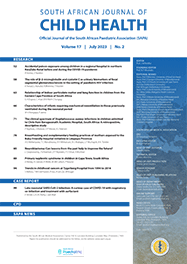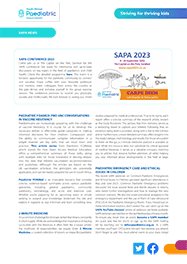Articles

Incidence and outcome of neonatal tetanus in Enugu over a 10-year period
Abstract
Aim. To study the trend and outcome of tetanus admissions among children in the University of Nigeria Teaching Hospital (UNTH), Enugu, Nigeria.
Method. All cases of tetanus admitted into the children’s ward of the UNTH over a 10-year period from July 1998 to June 2008 were analysed from the admission records.
Result. A total of 9 361 patient admissions were reviewed. Sixty-three (0.67%) of these patients had tetanus. Forty-one (65%) were neonates. Eighteen (28.6%) of the 63 patients with tetanus died, with mortality from neonatal tetanus (31.7%) not different from post-neonatal cases (22.7%) (p=0.45). Peaks of neonatal tetanus incidence were observed when immunisation of pregnant women was rejected by religious sects.
Conclusion. From this study hospitalisation for tetanus over the period in review was generally low. There was no definite trend and mortality was unacceptably high. Indeed, there was no change in the mortality pattern from tetanus during the period under review.
Recommendations. There is a need to strengthen immunisation against tetanus during antenatal care and by giving booster doses beyond infancy.
Authors' affiliations
Ifeoma Josephine Emodi, University of Nigeria
Anthony Nnaemeka Ikefuna, University of Nigeria
Christian Obichukwu, University of NIgeria Teaching Hospital
Keywords
Cite this article
Article History
Date published: 2011-12-06
Article Views
Full text views: 6776

.jpg)



Comments on this article
*Read our policy for posting comments here